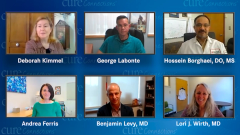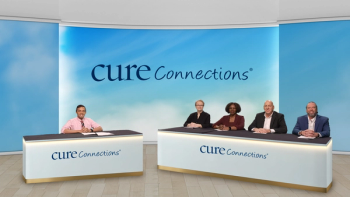
Personalized Medicine in Thyroid Cancer
Lori J. Wirth, MD, of Massachusetts General Hospital, comments on the role of molecular testing to guide treatment decisions in thyroid cancer and explains how personalized medicine differs from standard treatment approaches.
Episodes in this series

Hossein Borghaei, DO, MS: Dr Wirth, I wonder if you can comment about how personalization of care differs from common treatments. Why is that so important? If you can comment about what you think of the guidelines like NCCN [National Comprehensive Cancer Network] and ASCO [American Society of Clinical Oncology] regarding molecular testing, that would be helpful.
Lori J. Wirth, MD: Sure. I can make a great argument that thyroid cancer is the poster child for precision medicine in oncology. The identification of RET in medullary thyroid cancer in familial cases goes back 30 years. Approximately 60% to 70% of all thyroid cancers are going to harbor a potentially actionable alteration. In medullary thyroid cancers, the vast majority of patients who need systemic therapy are going to have RET mutations.
Personalized care in advanced thyroid cancer is exceedingly important. There are several reasons. One is that there are different types of advanced thyroid cancer. But even in the different subtypes, if we’re talking about iodine-refractory differentiated thyroid cancer, iodine-refractory poorly differentiated thyroid cancer, anaplastic thyroid cancer, or medullary thyroid cancer, even within those subtypes, there are vast variations in the natural history. When a patient with iodine-refractory papillary thyroid cancer walks through the door of the clinic, they may have a very different disease from the earlier patient who had the same diagnosis. Personalized therapy is crucial because the disease from patient to patient can differ a lot.
We do have a lot of different treatment options for patients. For patients who have indolent, very slow-growing disease, something like active surveillance may be very appropriate for a period of time, whereas for more rapidly progressive disease, you can’t wait and see how things are going to unfold. You have to start thinking about systemic therapy. We have therapies available that are gene-specific therapies, and then we have therapies that are available that are more multikinase inhibitors. They have great activity, and we have to weigh the risk-benefit ratio as well as what specific genotype is driving that tumor in order to select the best therapy for that particular patient.
Hossein Borghaei, DO, MS: It really does make a huge difference if we can personalize the delivery of care from every perspective.
This transcript has been edited for clarity.


